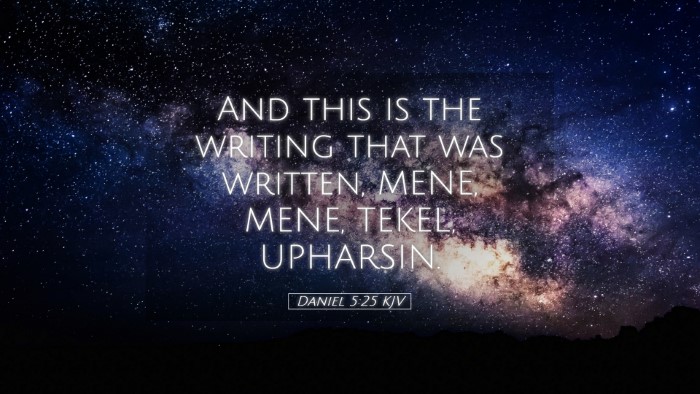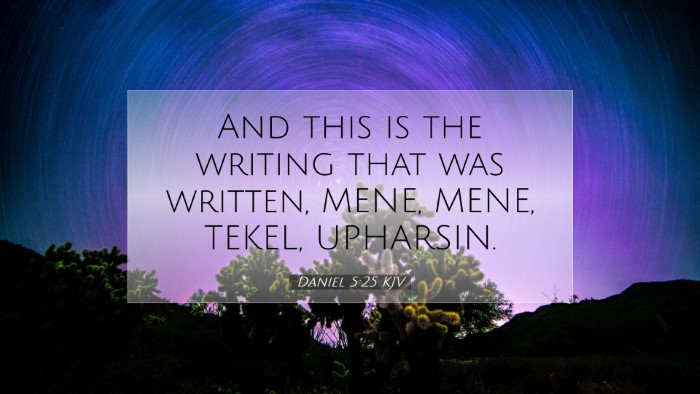Commentary on Daniel 5:25
Daniel 5:25 states:
"And this is the writing that was written, MENE, MENE, TEKEL, UPHARSIN."
Introduction
The fifth chapter of Daniel marks a significant turning point in the narrative of the Babylonian Empire. It presents the story of King Belshazzar's feast and the miraculous writing on the wall, which serves as a divine message of judgment. The intricacy of this passage demands a thorough analysis, drawing from historical, theological, and literary perspectives as provided by renowned scholars like Matthew Henry, Albert Barnes, and Adam Clarke.
Verse Exegesis
In verse 25, the phrase "MENE, MENE, TEKEL, UPHARSIN" consists of aramaic words that encapsulate a profound and solemn message. Each term signifies a distinct aspect of God's judgment against Belshazzar and, by extension, the Babylonian Empire.
- MENE: This word translates to "numbered" and indicates that God has counted the days of Belshazzar's reign. Matthew Henry elaborates, stating that this serves as a warning that human dominion is temporary and under the divine oversight of God.
- TEKEL: Meaning "weighed," this term signifies that God has weighed Belshazzar's deeds and found him wanting. Albert Barnes points out that this serves as a reflection on moral accountability, suggesting that accountability to God is an inescapable truth in human existence.
- UPHARSIN: Translated as "divided" or "to break," this term indicates that the kingdom shall be divided and given to the Medes and Persians. Adam Clarke clarifies that this signifies the imminent downfall of Belshazzar's reign, emphasizing the sovereignty of God in the affairs of nations.
Theological Implications
The writing on the wall serves as a powerful theological statement about God's sovereignty, justice, and the impermanence of worldly power. Belshazzar's pride and revelry are met with divine judgment, highlighting the principle that God opposes the proud but gives grace to the humble. This narrative speaks volumes to contemporary readers, reminding them of the importance of humility and reverence before God.
Moreover, the unity of the three terms underscores a holistic message about the divine assessment of human actions. Each concept encapsulates a part of God's judgment process, illustrating that no action is insignificant, and every deed carries weight in the balance of divine justice.
Historical Context
Understanding the historical context is crucial for interpreting this verse properly. Belshazzar was likely a co-regent with Nabonidus, and as external threats loomed, he chose to indulge in excess rather than heed the warnings of looming doom. Knowledge of Babylonian history reveals the tension within the empire at the time, making the message conveyed through the writing all the more potent.
The fall of Babylon marked a significant transition in human history, representing the shift of power from the Babylonian hand to the Persian hand. Such transitions underline the prophetic consistency found in the book of Daniel regarding the rise and fall of empires, as detailed by scholars like Barnes.
Literary Analysis
The literary structure of this passage contributes significantly to its theological weight. The abruptness of the writing's appearance amid a festal atmosphere heightens the contrast between human frivolity and divine seriousness. This Juxtaposition, as noted by Clarke, serves to shock the audience into the recognition of the inevitable consequence of ignoring divine authority.
The use of Aramaic serves to underline the significance of the message, making it not just a local warning but a universal truth applicable to all who heed or disregard God's voice. The brevity and weight of the phrases compel readers to reflect on their own lives and their relationship with God.
Conclusion
In summary, Daniel 5:25 encompasses a profound message woven into the historical and theological fabric of the narrative. The words "MENE, MENE, TEKEL, UPHARSIN" are not mere expressions of divine judgment but serve as a lasting reminder of God's sovereignty over the affairs of man. The insights provided by Matthew Henry, Albert Barnes, and Adam Clarke, when woven together, underscore the truth that God’s judgment is impartial and inevitable, providing a call to humility and reflection for all readers.


